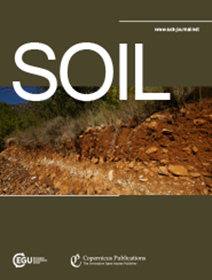土壤是造成全球温室气体排放和气候变化的一个主要因素
IF 5.8
2区 农林科学
Q1 SOIL SCIENCE
引用次数: 0
摘要
摘要人类活动增加了温室气体的排放,导致气候变暖,而且这些变化在几百年到几千年内都将是不可逆转的,这是毋庸置疑的。在这里,我们表明,我们几乎完全依赖土壤来生产人类迅速增加的食物需求量,这导致土壤释放出大量温室气体,威胁着未来的气候。事实上,仅土壤的人为净排放就占了混合温室气体导致的全球气候变暖(辐射强迫)总增幅的 15%,其中二氧化碳是土壤排放的最重要气体(占土壤变暖总量的 74%),其次是氧化亚氮(17%)和甲烷(9%)。当务之急是防止进一步改变土地用途(包括生产生物燃料),以限制因土壤有机碳流失而释放的二氧化碳,制定提高氮肥效率的战略以减少一氧化二氮的排放,减少稻田产生的甲烷,并确保避免永久冻土大面积解冻。如果我们要将全球升温控制在 1.5 或 2.0 °C,就迫切需要创新的方法来减少来自土壤的温室气体排放。本文章由计算机程序翻译,如有差异,请以英文原文为准。
Soil is a major contributor to global greenhouse gas emissions and climate change
Abstract. It is unequivocal that human activities have increased emissions of greenhouse gases, that this is causing warming, and that these changes will be irreversible for centuries to millennia. Here, we show that our near-complete reliance on soil to produce the rapidly increasing quantities of food being demanded by humans has caused soil to release profound amounts of greenhouse gases that are threatening the future climate. Indeed, net anthropogenic emissions from soil alone account for 15 % of the entire global increase in climate warming (radiative forcing) caused by well-mixed greenhouse gases, with carbon dioxide being the most important gas emitted from soil (74 % of total soil-derived warming) followed by nitrous oxide (17 %) and methane (9 %). There is an urgent need to prevent further land-use change (including for biofuel production) to limit the release of carbon dioxide that results from loss of soil organic carbon, to develop strategies to increase nitrogen fertilizer efficiency to reduce nitrous oxide emissions, to decrease methane from rice paddies, and to ensure that the widespread thawing of permafrost is avoided. Innovative approaches are urgently required for reducing greenhouse gas emissions from soil if we are to limit global warming to 1.5 or 2.0 °C.
求助全文
通过发布文献求助,成功后即可免费获取论文全文。
去求助
来源期刊

Soil
Agricultural and Biological Sciences-Soil Science
CiteScore
10.80
自引率
2.90%
发文量
44
审稿时长
30 weeks
期刊介绍:
SOIL is an international scientific journal dedicated to the publication and discussion of high-quality research in the field of soil system sciences.
SOIL is at the interface between the atmosphere, lithosphere, hydrosphere, and biosphere. SOIL publishes scientific research that contributes to understanding the soil system and its interaction with humans and the entire Earth system. The scope of the journal includes all topics that fall within the study of soil science as a discipline, with an emphasis on studies that integrate soil science with other sciences (hydrology, agronomy, socio-economics, health sciences, atmospheric sciences, etc.).
 求助内容:
求助内容: 应助结果提醒方式:
应助结果提醒方式:


